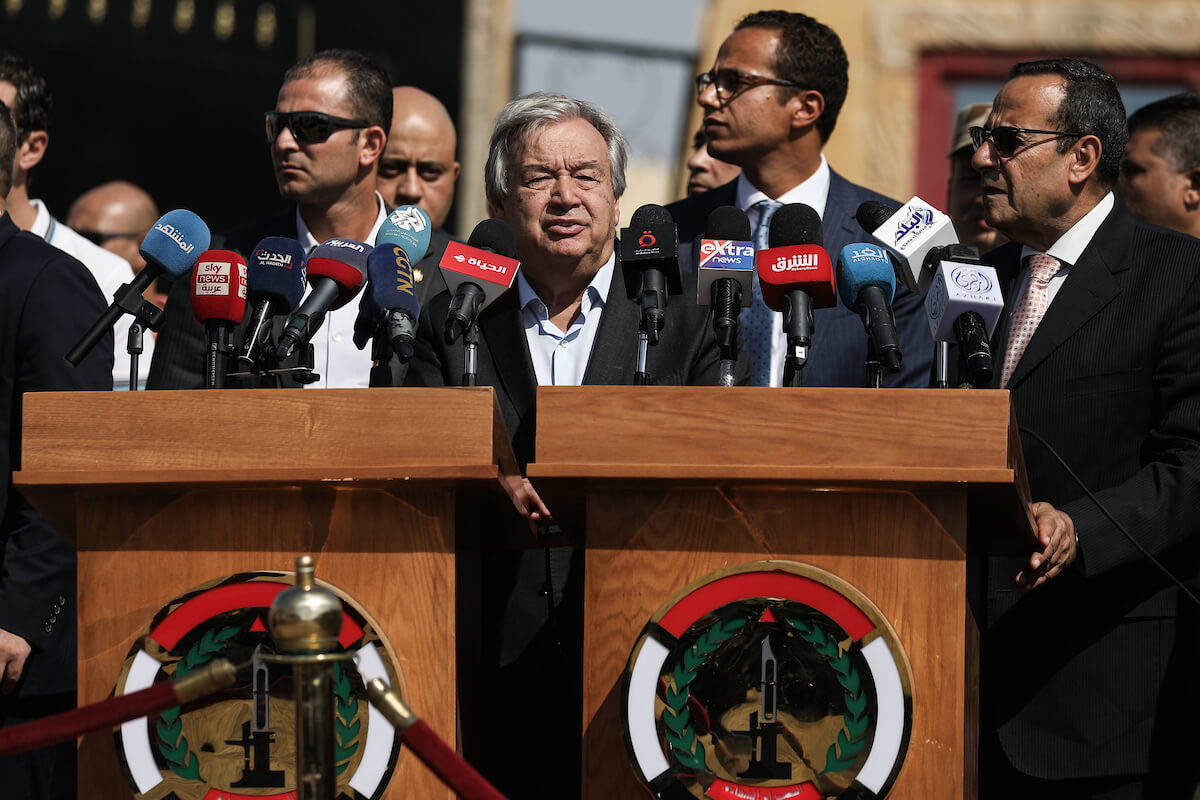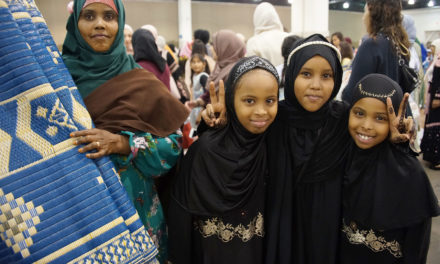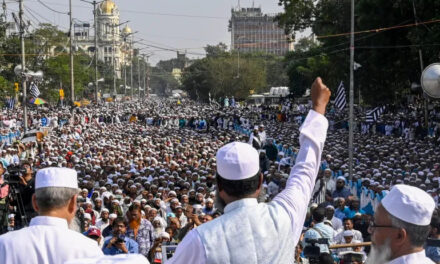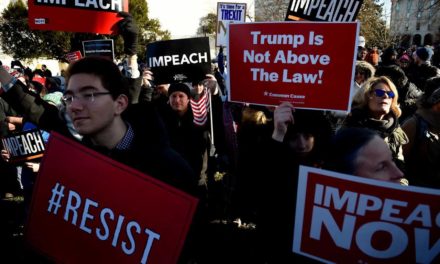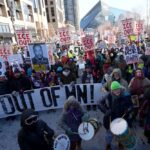UNITED NATIONS SECRETARY-GENERAL ANTONIO GUTERRES (CENTER) SPEAKS DURING A PRESS CONFERENCE AT THE RAFAH BORDER CROSSING BETWEEN EGYPT AND THE GAZA STRIP, OCTOBER 20, 2023. (PHOTO: © GEHAD HAMDY/DPA VIA ZUMA PRESS/APA IMAGES)
The two months since the start of Israel’s war on Gaza have revealed, yet again, the colonial foundations of international law, and uncovered the moral turpitude of the systems built on this basis. A captive Palestinian population of 2.3 million faces indiscriminate bombardment — already killing over 17,000 Palestinians as of the time of writing, mass forced displacement, starvation, genocide, and a host of other international crimes — while being deliberately deprived of their most basic needs for survival, all of it live-streamed. The application of international law and so-called “universal rules” undoubtedly meet a hard stop before being applied to Palestinians.
At the same time that the United Nations Secretary-General and heads of UN agencies have underscored the unprecedented scale of death and destruction in Gaza — described during the so-called “truce: as an “epic humanitarian catastrophe,” the UN is commemorating the 75th anniversary of the Universal Declaration of Human Rights (UDHR). With over 64 days of Israel’s genocidal rhetoric and action against Palestinians, 2023 will serve as an inauspicious year of UN commemorations and their realities. These realities are a continuation of the UN’s complicity in the formalization of the colonization and dispossession of the Palestinian people with the proposed partition of Palestine.
In November 1947, the dispossession of the Palestinian people began in the direction in which it would continue for the next 75 years — indifferent to Palestinian dignity and rights — with the passage of the infamous UN Resolution 181 on the partition of Palestine. Prior to the resolution’s passing, a UN sub-committee on the question of Palestine urged that acting without retaining an opinion on partition from the International Court of Justice “would amount to a confession that the United Nations are determined to make recommendations in a certain direction, not because those recommendations are in accord with the principles of international justice and fairness, but because the majority of the delegates desire to settle the problem in a certain manner […].” This recommendation, and the desires of the indigenous Palestinian people, were ignored with the passing of the partition resolution on November 29, 1947. This day is now annually, and unironically, observed by the UN as the International Day of Solidarity with the Palestinian People.
The partition resolution hastened both the Palestinian Nakba, wherein zionist militias expelled 750,000 Palestinians from their homes, killed nearly 15,000, destroyed hundreds of Palestinian villages, and declared Israel as a state. Within days, on May 20, 1948, the first official UN mediator in history, Count Folke Bernadotte, was appointed by the Security Council to serve in Palestine to lead what is considered “the UN’s first Special Political Mission (SPM).” Months after his appointment on September 17, 1948, Bernadotte was assassinated by the Stern Gang, a zionist militia; no one was held accountable for his assassination.
The year 1948 also saw the adoption of texts fundamental to the creation of a postwar international order, and which were central to the workings of the UN system. These texts include the adoption of the Convention on the Prevention and Punishment of the Crime of Genocide on December 9, 1948, and a day later, the adoption of the Universal Declaration of Human Rights on December 10. Moreover, the UN General Assembly passed Resolution 194(III) of December 11, 1948 in a nod to Bernadotte’s legacy, calling for the right of return of Palestinian refugees, and compensation for those “choosing not to return and for loss or damage to property.”
Seventy-five years later, many of these events have been officially marked by the UN. On May 15, 2023, the UN held its first-ever Nakba commemoration event. The UN has also commemorated 75 years of peacekeeping operations, beginning with Count Folke Bernadotte, and introduced the year-long Human Rights 75 Initiative that seeks, in part, to advance the UDHR’s “promise of freedom, equality and justice for all” and gather pledges by Member States, and others, on actions aimed towards the promotion and protection of human rights.
The tension between commemorating the UDHR at 75 within the context of the 75-year ongoing Nakba has not been lost on those within the system. As noted by UNRWA Commissioner-General Philippe Lazzarini, “Palestine refugees should not have to wait another 75 years to enjoy dignity, basic human rights and justice.”
Indeed, 75 years after the passing of Resolution 194, the majority of those living in Gaza are refugees from the Nakba; most of the population there — 1.93 million, according to OCHA — are now again displaced, some multiple times since October. Seventy-five years after Bernadotte’s assassination, the UN marked a moment of silence for the over 100 UN staff members killed in Gaza, “the highest number of UN aid workers killed in conflict in such a short time.” As of December 8, over 130 UN staff members have been killed. Seventy-five years after the adoption of the Genocide Convention, UN experts called on the international community to prevent a “genocide in the making” in Gaza. Seventy-five years after the adoption of the UDHR, the universality of human rights is subject to debate when politically inconvenient and economically profitable.
Israel’s relentless aggression against Palestinians — whether in Gaza, the West Bank (including Jerusalem), Israeli prisons, or within the land it colonized in 1948 — is part of its established systems of persecution that have been enabled by over seven decades of impunity. This institutionalized status quo provides the “best” assessment of the legitimacy and legacy of the UDHR on its 75th anniversary, as well as the efficacy of the international system, which consistently shields Israel from any form of accountability.
Instead, under the watchful eyes of Western states and in an international vacuum of impunity for the strong, those most impacted are lectured on humanity — which they are denied — and on the value of an international system based on the rule of law and human rights, even though those rights do not seem to apply to them.
In this way, the Palestinian experience is also one of countless global experiences that have underscored both the need to revolutionize international law and reform the UN, both of which strongly reflect past and current power structures of colonialism and domination. This was again spotlighted by the U.S.’s sole veto for a ceasefire resolution, which had nearly 100 co-sponsors and was brought following unprecedented action by the UN Secretary-General. Only by challenging and changing these realities and systems will the ideals of the Universal Declaration for Human Rights be achieved.
